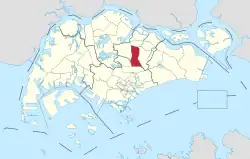Serangoon | |
|---|---|
| Other transcription(s) | |
| • Malay | Serangoon (Rumi) سرڠݢون (Jawi) |
| • Chinese | 实龙岗 (Simplified) 實龍崗 (Traditional) Shílónggǎng (Pinyin) Si̍t-lêng-kong (Hokkien POJ) |
| • Tamil | சிராங்கூன் Cirāṅkūṉ (Transliteration) |
     From top left to right: Terraced housing in Serangoon, HDB flats in Serangoon North, Serangoon Viaduct, Lorong Chuan MRT station, Nex | |
 Location of Serangoon in Singapore | |
.svg.png.webp) Serangoon Location of Serangoon within Singapore | |
| Coordinates: 01°21′49″N 103°52′03″E / 1.36361°N 103.86750°E | |
| Country | |
| Region | North-East Region
|
| CDCs | |
| Town councils |
|
| Constituencies | |
| Government | |
| • Mayors | Central Singapore CDC
North East CDC South East CDC |
| • Members of Parliament | Aljunied GRC
Ang Mo Kio GRC Marine Parade GRC |
| Area | |
| • Total | 10.1 km2 (3.9 sq mi) |
| • Residential | 1.63 km2 (0.63 sq mi) |
| Population | |
| • Total | 116,310 |
| • Density | 12,000/km2 (30,000/sq mi) |
| Postal districts | 19, 28 |
| Dwelling units | 21,293 |
| Projected ultimate | 30,000 |
Serangoon (/səˈræŋɡuːn/) is a planning area and residential town located in the North-East Region of Singapore.
Serangoon is bordered by these planning areas – Sengkang to the north, Hougang to the east, Ang Mo Kio and Bishan to the west, as well as Toa Payoh to the south. Serangoon planning area has a total of seven subzones: Serangoon Central, Lorong Chuan, Upper Paya Lebar, Serangoon Garden, Serangoon North, Seletar Hills and Serangoon North Industrial Estate.[4]
Transportation
The original Serangoon bus interchange was opened on 13 March 1988 along Serangoon Central.[5] It later relocated to nex on 3 September 2011.[6]
A large part of the North East MRT line runs in parallel with this arterial road. Stations that are located along this road are from Little India to Kovan.
Road network
Upper Serangoon Road is an important road being one of the oldest and busiest roads, links the North-East region with Central area
Other important main roads include Yio Chu Kang Road, Upper Paya Lebar Road, Bartley Road, Braddell Road, and Ang Mo Kio Avenue 1 and 3.
The CTE (Central Expressway) at the west of the town provides a link to Seletar Airport, Toa Payoh and CBD (Central Business District).
Education
As of 2017, this area has a total of 5 primary schools, 4 secondary schools and Nanyang Junior College.[7]
Politics
Serangoon Neighbourhood 1, some parts of Neighbourhood 2 and Serangoon Garden fall under the Aljunied GRC (Serangoon division), served by the Workers' Party, while the area surrounding Upper Paya Lebar Road lies within the Aljunied GRC Paya Lebar division. Prior to 2006, the Serangoon division belonged to the Marine Parade GRC, which administers Serangoon Neighbourhoods 2, 3 and 4 in the Braddell Heights division till this day. Neighbourhood 5 in Serangoon North falls under the Ang Mo Kio GRC (Jalan Kayu division).
See also
Gallery
References
- 1 2 "City Population – statistics, maps and charts | Serangoon". Archived from the original on 15 August 2019. Retrieved 20 June 2023.
- 1 2 HDB Key Statistics FY 2014/2015 Archived 4 March 2016 at the Wayback Machine
- ↑ "Statistics Singapore - Geographic Distribution - 2018 Latest Data". Archived from the original on 30 January 2016. Retrieved 11 February 2019.
- ↑ "Archived copy" (PDF). Archived from the original (PDF) on 5 March 2016. Retrieved 24 October 2015.
{{cite web}}: CS1 maint: archived copy as title (link) - ↑ "Interchange in new town opens on Sunday". The Straits Times. 8 March 1988. Archived from the original on 6 July 2022. Retrieved 23 June 2017 – via NewspaperSG.
- ↑ "Bus Services Operating From The New Serangoon Bus Interchange". SBS Transit. 25 August 2017. Archived from the original on 29 June 2021. Retrieved 23 June 2017.
- ↑ "School Information Service". Archived from the original on 31 May 2016. Retrieved 20 June 2023.
Sources
- Victor R Savage, Brenda S A Yeoh (2003), Toponymics – A Study of Singapore Street Names, Eastern Universities Press, ISBN 981-210-205-1
